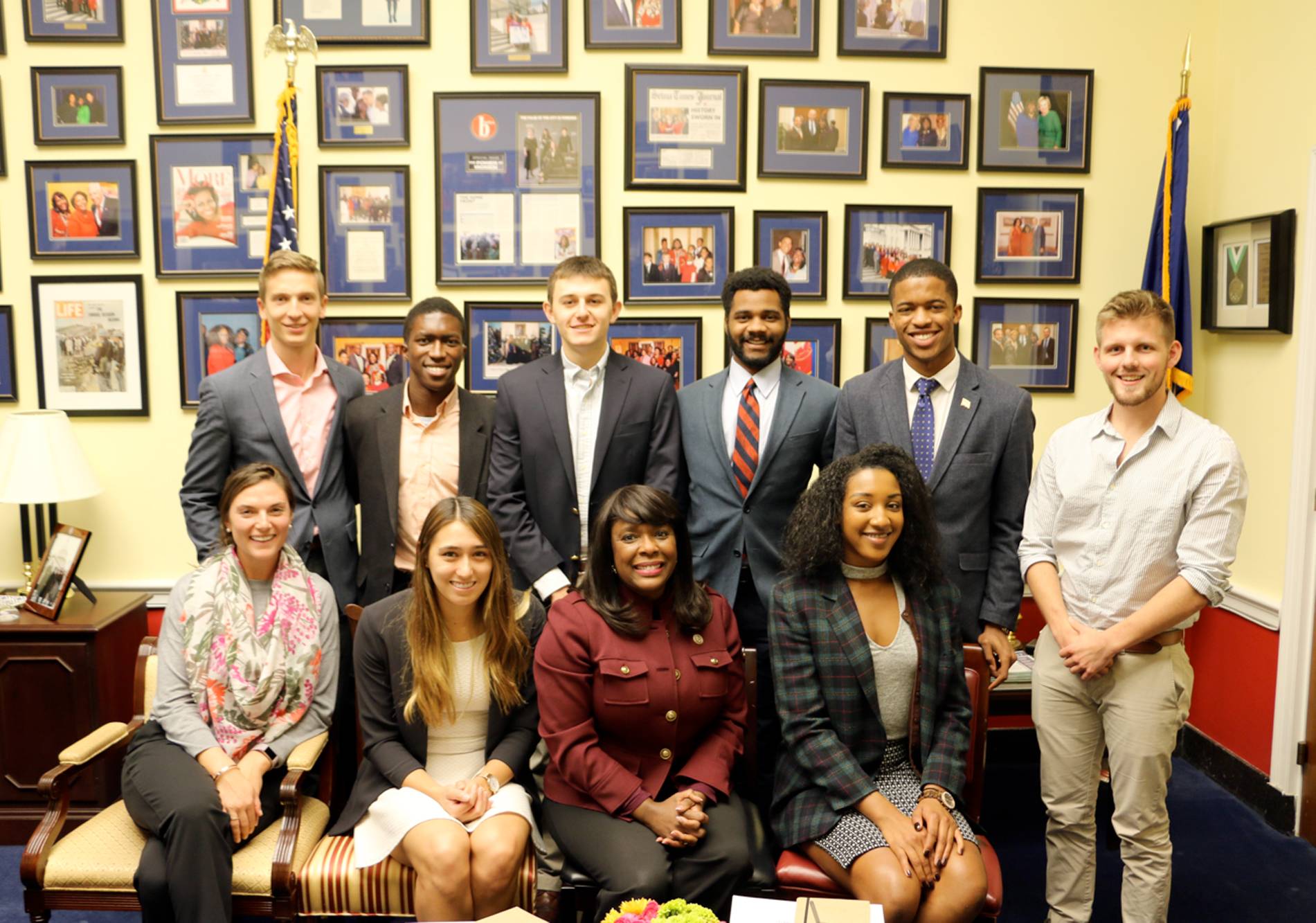
During Princeton University's fall break, a cohort of undergraduates met with leaders of think tanks, philanthropies and elected officials to cultivate their capacity for citizenship and leadership on campus and to prepare them for service and success in a global society as part of the Next Generation Citizenship program. Among the officials who students met in Washington, D.C., was Terri Sewell (seated at center), a Democratic congressperson from Alabama's 7th district and a 1986 Princeton alumna.
During Princeton University's fall break, a cohort of undergraduates met with leaders of think tanks, philanthropies and elected officials to cultivate their capacity for citizenship and leadership on campus and to prepare them for service and success in a global society.
The Next Generation Citizenship program consists of three workshops on campus: on leadership principles and values; on democracy, engagement and collaboration; and on employing design-thinking strategies to improve citizenship engagement, in collaboration with the Keller Center. The program also included a three-day trip to Washington, D.C., where students met with policymakers and think-tank leaders interested in the future of democratic citizenship and the importance of civil discourse.
The Next Generation Citizenship program is an initiative in the Office of the Dean of Undergraduate Students, supported by Deputy Dean Thomas Dunne. The curriculum was developed by Elizabeth Garlow, a graduate student at the Woodrow Wilson School of Public and International Affairs who took a sabbatical from her studies to work in the Obama White House, and Abby Skeans, a Washington, D.C.-based attorney.
Dunne said that during a visit to Princeton, Garlow noted that "her colleagues in D.C. were becoming increasingly concerned about an erosion of civil discourse in politics."
Said Dunne, "Elizabeth expressed an interest in developing a program on campus that revitalized conversations about citizenship and civil discourse, and charting a way for students to think about citizenship and engagement in a non-binary, non-Democrat-versus-Republican way."
Among the officials who students met in Washington, D.C., was Terri Sewell, a Democratic congressperson from Alabama's 7th district and a 1986 Princeton alumna. Sewell is the first black woman to serve in Alabama's congressional delegation.
Throughout the program, students also networked with and were mentored by alumni. Joe Kochan, a 2002 Princeton alumnus, hosted a welcome reception for the participants and D.C.-area alumni, and shared his work as chief operating officer of US Ignite, a nonprofit that fosters the creation of next generation applications and services that leverage advanced networking technologies to build the foundation for smart communities. Rishi Jaitly, a 2004 Princeton alumnus who is a Chicago-based technology and social change entrepreneur, served as an adviser to the program, and helped to secure meetings with thought leaders.
"[The program] gives students an opportunity to learn about the nuances of citizenship — all the in-between forms — that are often unmeasured in our communities," Jaitly said. "I have a pretty big crush on what the Office of the Dean of Undergraduate Students is doing. The opportunity to be a part of helping enable a sense of agency and citizenship in students today is in stride not only with everything I do every day, but also with what my own undergraduate experience was."
"A real strength of the program was the students' engagement with the subject matter and ability to engage in civil discourse," said Claire Pinciaro, a leadership program coordinator in the Office of the Dean of Undergraduate Students and a 2013 Princeton alumna who helped develop the project's curriculum.
Prospective participants were required to complete an application. Students were selected on the basis of their interest in citizenship engagement, curiosity as it relates to civil discourse and desire to explore principle-based leadership. The students recruited to participate in the pilot program were very receptive to the organizers' curriculum and approach, Pinciaro said.
"This program represents an effort by the University to actively support principle-based leadership and difficult conversations on both sides of the aisle," Mikhael Smits, a senior majoring in politics, said. "That's new here, and virtually unheard of elsewhere. I was glad to be a part of it, and hope it continues long after I've graduated."
Smits, who is earning certificates in history and the practice of diplomacy, values and public life, and Near Eastern studies, is a recently naturalized U.S. citizen. "This program asked us to grapple head-on with our first principles, roles as citizens and conceptions of effective leadership," he added. "I've been in the U.S. most of my life, but always as a conscious outsider. Even at Princeton, there were opportunities closed to me because of my residency status. But Princeton has played such a profoundly positive role in encouraging my becoming American."
Smits said he most enjoyed focusing on specific issues with the other students. "We come from different places, with different interests and different beliefs, and our conversations, in addition to making clear our differences, actually reflected common sentiments and brought us closer together," he said.
"The group became really tight knit," Dunne said. "To watch them interact in both formal and informal settings was really wonderful. We are really excited to see where this project can go — not only at Princeton, but also as a model that can take root at other institutions."





